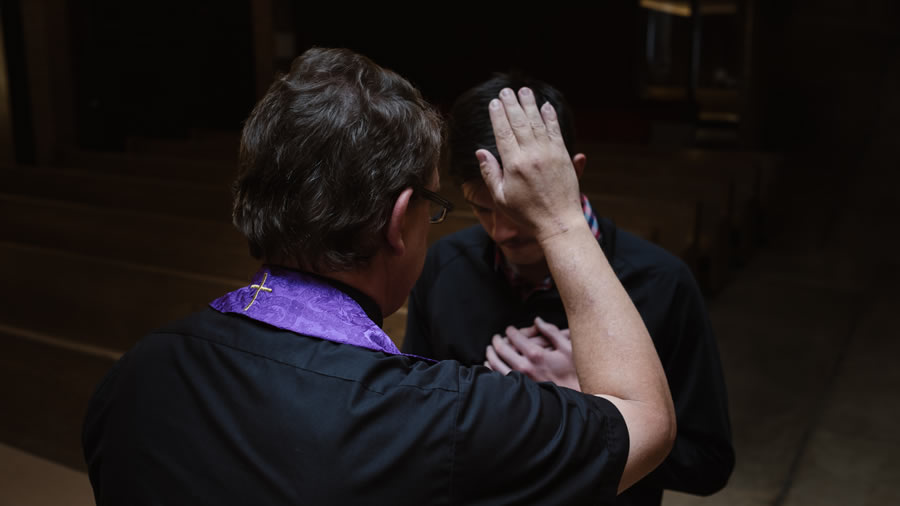
A Brief Catechesis on Penance
02-21-2021AllWhat is a sacrament? A sacrament is an outward sensible sign instituted by Christ to give grace. What is grace? Grace is a gratuitous gift from God to us. Sanctifying grace is first given to us in baptism and is increased by all the sacraments. It is the beginning of heaven because through it the individual shares the very life of God the Blessed Trinity as a son or daughter and his or her humanity becomes a temple. Sacraments also give actual grace which is the grace to live out the sacrament and to live as a Christian in all the circumstances of life.
What is the Sacrament of Confession (Reconciliation, Penance)? This is the sacrament instituted by Jesus Christ through which He forgives the sins committed after baptism through the ministry of His ordained priests. Who gave us the Sacrament of Confession? Jesus Himself established this sacrament for the forgiveness of our sins. John 21: 19-23
What are the parts of the Sacrament of Confession? The parts of the Sacrament of Penance are contrition, confession, and satisfaction for the temporal punishment due to sin.
What is contrition? Contrition is sorrow for sin. Imperfect contrition is sorrow because the person fears the punishment of Hell. This is sufficient for forgiveness in the sacrament. However, the Church teaches that we ought to strive for perfect contrition. Perfect contrition is sorrow for sin because it has placed an obstacle in our relationship with God who loves us and is all good and worthy of all love. 1 John 4:18
What is Confession? Confession is the telling of our sins to the priest and it must be integral, that is, all mortal sins must be confessed by number and kind: how many were there and what they were? The Church also encourages the confession of venial sins which weaken our relation with God as the best way to have them forgiven. The Confession of venial sins is called a Confession of Devotion. It is the best way because Confession increases the life of God within us through sanctifying grace.
What is a mortal sin? Mortal sin also known as grave sin is a serious sin that deprives a person of sanctifying grace rendering them spiritually dead. Unrepentant mortal sin leads to hell. Mortal sin means a deadly sin because it kills God’s life in us. 1 John 5: 16-17
How do you know if you have committed a mortal sin? A mortal sin is committed when there is serious matter AND the person knows it is serious (deliberation) AND fully consents to it.
What is a venial sin? A venial sin is a lesser sin which does not deprive us of God’s life but weakens it in us.
What is satisfaction or the meaning of the penance the priest gives in Confession? Satisfaction means making up for the damage that our sins have caused in ourselves, the Church, and the world.
What is the communion of saints? The communion of saints means that the Church exists as Christ’s Body, His family made up of many members. It means that the life of each of God’s sons and daughters is joined to Christ and through Him joined to the lives of all other Christians. It means a sharing of mutual help, expiation, prayers, and kindnesses. This sharing takes place between all the family members whether they are in heaven, whether they are being purified in Purgatory, or whether they are on earth. This total family is present at every Mass.
What is the treasury of the Church? The treasury of the Church is the accumulated holiness before God of Christ, the Virgin Mary, and all the saints. This holiness contributes to the holiness of others and their salvation because of the power and healing effect of divine love.
What are indulgences? An indulgence is a special sharing in the healing power of the holiness of Christ and His saints. An indulgence heals before God the temporal punishment due to sins whose guilt has already been forgiven. This can be a complete healing called a plenary indulgence or a partial healing called a partial indulgence.
What is the temporal punishment due to sin? Sin has a double consequence: Mortal sin deprives us of communion with God and makes us incapable of eternal life. Every sin, even venial, also entails an unhealthy attachment to created things. All sin has negative consequences which cause wounds. This wound must be healed in this life or in the life to come.
Is this some kind of vengeance inflicted by God on the sinner? No. The very act of sin produces disorder in self and in the Church and in the world. These are the negative consequences of our sins, “the punishment,” which must be endured and healed by prayer, penance, and God’s grace.
Is it possible for someone to go straight to heaven upon death because there is no temporal punishment for sin remaining? A plenary indulgence would accomplish this. Whether it is actually gained is known only to God. A conversion which proceeds from a fervent love of God can attain that complete purification of the sinner in such a way that no punishment would remain. Think of the “good criminal” crucified with Jesus, whom tradition has named St. Dismas. He turned to the Lord with such fervor that our Lord promised him Paradise that very day! Luke 23:43
Cf.Catechism of the Catholic Church #1472, 1473
#489